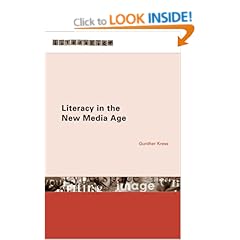Gunther Kress on Literacy
 I’ve been doing more studying this evening, this time looking again at Gunther Kress‘ 2003 book Literacy in the New Media Age. There’s lots to like and agree with in Kress’ writing, but there’s a couple of things I’d take issue with, not least his definition of literacy:
I’ve been doing more studying this evening, this time looking again at Gunther Kress‘ 2003 book Literacy in the New Media Age. There’s lots to like and agree with in Kress’ writing, but there’s a couple of things I’d take issue with, not least his definition of literacy:
…for me literacy is the term to use when we make messages using letters as the mans of recording that message. When we communicate through numbers, we use the term ‘numeracy’, and for very good reasons: the meaning-potential and the meanings made with numbers are very different from those made with letters. (p.23)
This is a fair enough point, that literacy should mean something specific. But I’ve decided that I don’t agree with what he goes on to say about adding prefix modifiers:
My approach leaves us with the problem of finding new terms of the use of different resources: not therefore ‘visual literacy‘ for the use of image; not ‘gestural literacy‘ for the use of gesture; and also not ‘musical literacy‘ or ‘soundtrack literacy‘ for the use of sound other than in speech; and so on. (p.23)
I think he’s used unfair examples. If we substitute instead ‘media literacy’ and ‘digital literacy’ I think that many would argue that these are different in the way that he accepts numeracy to be. If literacy is, as Kress believes, simply creating messages using letters, there would seem to be no point in his work and the following statement earlier in his book:
Given that in the world of the new media there are numerous modal resources involved in the making of ‘messages’ – word, spoken or written; image, still and moving; music; objects as 3D models; soundtrack; action – it has in any case become essential to ask what we mean by ‘literacy’. (p.21)
Clearly, he feels that there is something that is not quite being described by our current terminology.:
They make it easy to use a multiplicity of modes, and in particular the mode of image – still or moving – as well as other modes, such as music and sound effect for instance. They change, through their affordances, the potentials for representational and communicational action by their users; this is the notion of ‘interactivity’ which figures so prominently in discussions of the new media. (p.5)
This element that Kress terms ‘interactivity’ is what sets digital/21st-century/whatever ‘literacy’ apart from its standard definition. Kress would deny that it is in fact a literacy and instead claims it’s a skill:
[W]e can have writing or speech as the names of two resources for making meaning. Using pencil, pen, (computer) keyboard or whatever else are then separate and different matters, involving the skills of both production and dissemination, which may be more or less closely integrated with the potentials of the resource. Literacy remains the term which refers to (the knowledge of) the use of the resource in writing. The combination of knowledge of the resource with knowledge of production and perhaps with that of dissemination would have a different name. That separates, what to me is essential, the sense of what the resource is and what its potentials are, from associated questions such as those of its uses, and the issue of whether skills are involved in using a resource in wider communicational frames. (p.24)
However, this does not make clear as to whether ‘literacy’ under Kress’ conception and definition can be deemed a skill, item of knowledge, combination of the two, or neither. Whilst he quite rightly points out that the term ‘literacy’ has, and is being, used to lend credibility and legitimacy to questionable ideas (p.24-25), this does not mean he needs to ‘throw the baby out with the bathwater’, so to speak.
One of his main arguments not to extend ‘literacy’ to mean more than creating messages using written forms is that other languages do not contain the word. I believe this to be a weak argument. He asks rhetorically whether English, as the dominant world language, should impose the word ‘literacy’ and demand that other languages have a translation of it. He conflates this with the quite valid point that the more things to which a concept can be applied, the less it means. To my mind, there’s absolutely no valid reason Kress gives why a modifying prefix such as ‘digital’, ‘media’ or ’21st-century’ cannot be placed in front of the word ‘literacy’ to make it apply to a specific context.
I’m going to be thinking more about this. These are just my initial thoughts. You can see more over at my wiki. 😀

![Reblog this post [with Zemanta]](http://img.zemanta.com/reblog_e.png?x-id=e561566a-5e0d-423a-a5ed-22ed58833bd7)
